Reception and Processing at Fort Lewis: Welcome to the U.S. Army (1950s)
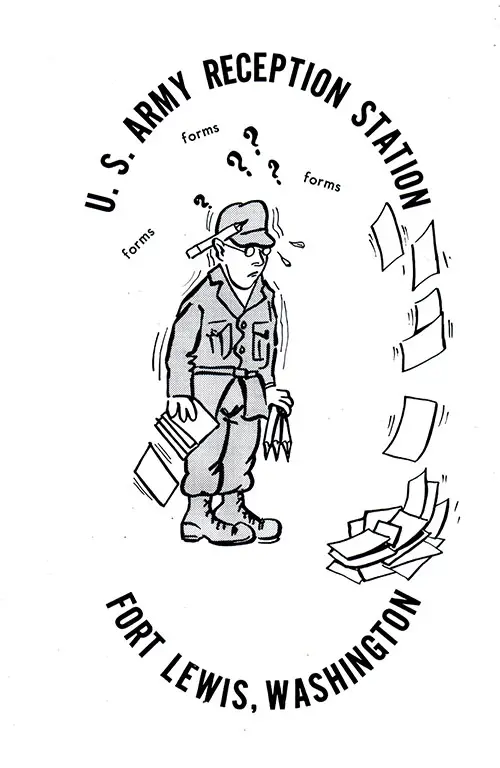
Front Cover, Fort Lewis US Army Reception Station, Fort Lewis, Washington, n.d. circa 1950s. | GGA Image ID # 23452b1681
📘 Review & Summary: US Army Reception Station, Fort Lewis – 1950s
🎯 Overview
This 1950s-era informational brochure from the Fort Lewis Reception Station offers a fascinating and richly detailed look into the transitional phase between civilian life and military service during the Cold War. Produced by the U.S. Army, this document guided new recruits through a structured 3–5 day orientation and processing program at one of the West Coast’s major military hubs.
It’s a rare, authoritative, and vivid resource—not only for understanding the mechanics of mid-20th-century enlistment but for exploring social expectations, personal preparedness, and institutional discipline during the Korean War and early Vietnam era.
Table of Contents
🛡️ Editorial Note: This summary and transcribed material uses updated language to ensure it is safe and appropriate for readers age 13+. The original brochure text is preserved below in its original form for historical accuracy and transparency. Please use discretion when reading older materials, as norms and phrasing have evolved.
Forward
On behalf of the Commanding General of Fort Lewis and the Commander of this Reception Station, we extend a hearty welcome to-each and every one of you. You are now soldiers in the first military force the world has ever known, the United States Army.
For almost 200 years the Army and its soldiers have served in defense of our country, helped to preserve the American way of life, and made important contributions to our progress as a nation. You are now part of that Army. Serve it proudly, serve it well.
The Reception Station is the first step in preparing you for the new and varied experiences that will confront you while in the Army. You will be here approximately three to five days. For the most part, your time will be devoted to processing. Although your stay here is only brief, it is a very important phase of your military career.
This booklet has been prepared to assist you in understanding your processing, and as an aid in familiarizing you with the facilities that are available for your use while at the Reception Station.
Do your best at all times, pay close attention and above all, maintain a good sense of humor. Every attempt will be made to make your stay in the Reception Station both informative and productive.
Mission of Reception Station
The mission of the U. S. Army Reception Station is to receive and process newly enlisted and inducted personnel as well as those reentering the U. S. Army. Upon completion of your processing, you will be assigned and shipped to a basic training company.
Personnel entering the Reception Station at Fort Lewis generally come from Alaska, Arizona, Hawaii, Idaho, Montana, Utah, California, Nevada, Oregon, and Washington.
During your stay in the Reception Station we expect your utmost cooperation so that you will complete your processing as rapidly as possible.
Processing Schedule
Let us take a look at the processing that you will go through during your stay at the Reception Station and why this processing is necessary.
Your processing will be completed in four working days known as Day of Arrival. First Day, Second Day, and Third Day Processing. The sequence of the processing is shown below; however, in some individual cases the sequence of processing may be altered. In any event, everyone will be given all the processing required before his departure to a Basic Training Unit.
Day of Arrival Processing
On this day your processing will include; Preparation of locator cards, completion of personal data sheet required for initiation of your military records, turn in prohibited items, bedding issue and bar- racks assignment. The medical branch will type your blood and give you the TINE test for tuberculosis. You will also be shown a motion picture film on the "Uniform Code of Military Justice", which is the Army’s system of laws and corresponds generally with laws of your home town.
First Day of Processing
On this day your processing will include: Ad ministration of a series of tests to determine your aptitude and abilities so that your Army job will be within your ability; personal affairs interview, fingerprinting, and preparation of your ID card. Some of you claim speaking ability in a foreign language, you will be given a special test in the language.
Second Day Processing
On this day your processing will include the taking of additional classification tests, and a personal interview to find out those things about your background and abilities that the written tests don’t show. The interview is very important in determining your assignment in the Army. You will be given an advance partial pay of $35.00 to cover incidental expenses you may incur while at the Reception Station.
Third Day Processing
On the third and final day of processing you will be given your immunization inoculations, commonly known as “shots”, to protect you against diseases. They are; Tetanus, Typhus, Smallpox, and Flu. Name tapes will be sewn on your uniforms. Finally, you will turn in your bedding, police your barracks, and after the noon meal you will be shipped to your Basic Training Company.
Importance of This Processing
The preceding paragraphs briefly describe the events which you will go through during your processing; however, as this processing is of extreme im- portance to your Army career, you will find below additional information concerning particular phases of this schedule.
Medical
You will notice that there is some type of medical processing on every day of the processing schedule. This is because the Army is extremely interested in the health and well being of each individual soldier. In approaching this problem of keeping the soldier in peak fighting trim, the Army has initiated a program for prevention of disease and prevention of minor ailments from escalating into ones of a more serious nature. This is accomplished by means of a series of inoculations and physical examinations and checkups which discover abnormalities before they can become serious. If and when it becomes necessary for you to receive a blood transfusion, the blood typing which you have received here will be an important timesaving device in the treatment.
Testing
You will be administered a series of tests as part of your classification processing. The results of these tests indicate to the Army the type of work you are best qualified to perform. Therefore, they are a very important part in the determining of your future assignment. In addition to the Army Classification Battery test, which tests your previous background or training, other tests may include a foreign language test, an officer candidate test, and a language aptitude test. It will behoove you to give your maximum effort in your performance on these tests for they are of extreme importance to your Army career.
Initiation of Records
While in the Reception Station you will be given a lecture concerning your personal affairs while you are a member of the United States Army. Following the lecture an interview will be given each man so that your records can be complete or verified. Individuals who are enlistees in the Army or who were drafted will be eligible for allotments. Allotments are made out upon your request and can be used for the following reasons: Savings Bonds, Insurance Premium Payments, Support of Dependents, etc. In addition, you should have available on your person when having your personal affairs interview, all pertinent and important papers, such as: Social Security Card, certified Marriage License, prior Service Records and other in- formation which will facilitate rapid processing of your records.
Classification Interview
The individual interview which you will receive at Classification is the most important of your Army career, for it is here that your future job assignment is determined in the Army. By using test scores, previous education and jobs in civilian life, and your own desires, the inter- viewer will recommend an assignment for you commensurate with your skills and abilities in accordance with Army needs. Cooperate with the interviewer, the information which you give will be of utmost importance in determining future Army assignments.
Duties and Responsibilities of Receptees
The Reception Station has initiated certain rules and regulations that will govern your actions while you are in that station. These rules are made for the protection of each individual receptee, and must be obeyed without exception.
- To facilitate processing, you normally will be formed into 48 or 55 men platoons with a non-commissioned officer in charge of each group. He is re- sponsible for having you at the right place at the right time, for answering your questions, and for your conduct and discipline.
- Keep yourself and your barracks clean. Standards of sanitation and personal hygiene in the Army are high. Shave and shower at least once a day. There are cans in the barracks for trash, cans painted red for ashtrays and cans used for razor blades in the latrines. When outside the barracks strip your cigarette butts by tearing them down the side and place them in butt cans. Do not throw them on the ground. There are receptacles provided for paper and other trash items; use them.
- Smoke in authorized areas only, DO NOT SMOKE IN BED. Do not smoke in areas where "No Smoking" signs are posted. Do not throw cigarette butts on the ground or floors of buildings.
- Read the fire and evacuation plans posted in the barracks and know the location of your fire extinguishers. These fire precautions are extremely im- portant since these frame buildings are highly flammable.
- Receptees may not leave the Reception Station, unless authorized to do so on official business.
- There will be no running or “Horseplay” in the Reception Station area. Keep off grass, use the sidewalks or roadways.
- If at any time your property is lost or stolen, report it immediately to the First Sergeant or Roster Guide.
- Gambling and the possession of [Alcoholic Beverages] are strictly prohibited.
- Do not enter any barracks except your own unless you are on detail and under proper supervision.
- Lights and radios will be turned off and talking stopped at 2100 hours (9:00 PM).
- Should anyone ask you to give money for any cause or try to sell you something, report it to your Roster Guide or Company Commander.
- Civilian clothing will not be worn after you have received your Army clothing. When wearing civilian clothing, shirts will be worn inside trousers, shoes will be laced, hair combed, so that you present the neatest possible appearance. When wearing Army uniform, boots will be fully laced, all buttons will be fastened, belt will be worn, and the hat will be worn at all times when outside of buildings.
- Because the Reception Station is a self-sustained operation you will be called upon to perform details with the station, these will be kept to an absolute minimum. Your Roster Guide will inform you if you are selected for detail, in the event you are placed on detail, you will report to the detail area no later than the time specified and will not leave that area until you are officially relieved.
Prohibited Items
There are certain items which you may not retain in your possession while you are in the Army. These include: explicit materials, inappropriate literature, unauthorized weapons, and narcotics. [Original terminology has been modernized for classroom suitability.] If you have any of these items, you will have an opportunity to turn them in. Don’t be embarrassed; now is the time to discard them before you get into trouble. If you have a knife, pistol, rifle or other firearms of such value that you wish to send it home, see the Officer in Charge when you turn it in.
Postal Service
Your family, wife or girlfriend is interested in what you are doing and how you are making out. We encourage you to write them as soon as possible and tell them of your safe arrival at Fort Lewis.
There is a mail box at each company orderly room for your convenience. Mail pickups are made in the morning and afternoon.
During your free time, you will be given the opportunity to ship your civilian clothing and miscellaneous items not required during processing and BCT to your home at government expense.
When writing home, DO NOT use the Reception Station as your return address. You will be in the station only a short time and the use of the Reception Station as your return address will only create an unavoidable delay in delivery of your mail. When writing your family, inform them that you will send your permanent address as soon as you have reached your Basic Training Company.
Post Exchange
The Post Exchange is available for use to receptee personnel. Here you will find cigarettes, snack items, stationary, daily necessities, newspapers, magazines, books, and many other items are available for purchase. For people living in the Reception Station area, the PX to use will be specified by your Roster Guide. The PX is authorized for your use at time stated by your CO and Roster Guide. There are pay phones available for long distance calls next to your assigned mess hall.
Leaves and Passes
During your service in the U. S. Army you will accrue leave at the rate of 212 days per month or 30 days per year. You will be eligible for passes which are given for outstanding job performance.
Leaves will not ordinarily be given while you are in the Reception Station or Basic Combat Training; however, if there is a serious illness or death in your family, an emergency leave may be granted. To get an emergency leave you will need the help of the American Red Cross, therefore read the Red Cross Information Sheet, which is at the back of this booklet and then send the sheet home to your folks as soon as possible.
Private Vehicles
If you drive your car to Fort Lewis, you will run into a great deal of difficulty. Off post parking is costly; on post parking facilities are limited. You must have full insurance to register your vehicle and bring it on the post. In addition, when you complete individual training you may be shipped out overseas or to other posts and have little time or opportunity to sell your car at a fair price or return it home. We recommend strongly that you leave your car at home or, if you have brought it with you, that you make arrangements to return it home as soon as possible.
Complaints and Grievances
Every man in the Army is entitled to the privilege of making complaints so long as they are honest and valid complaints and provided the Chain of Command is followed. If you should have any complaints or grievance, first contact your Roster Guide. If be cannot assist you, he will send you to the Reception Station Commanding Officer. This chain of command could be used all the way up to the President of the United States if it were necessary. Whether here or at any other Army Post the same procedure is followed. In certain cases you will be allowed to go see the Inspector General, whose duty it is to listen to your complaint, look into the facts of each case, and then take action to correct the situation if necessary. Do not, however, see the Inspector General on your own. If you do, you will be sent back through the chain of command. Should it be necessary to see him, get permission first, before taking any action.
Legal Assistance
In the Army there is always someone available to help you solve your problems. For legal affairs we have the Judge Advocate’s Office which is staffed by qualified lawyers who are more than willing to assist you in solving your legal problems free of any charge.
Service Obligations
US AND RA PERSONNEL
The Reserve Forces Act of 1955 imposes on you a six year service obligation. Upon completion of your two or three years active duty, you will be released and transferred to an element of the Army reserve. If you desire to complete your service obligations with a unit of the National Guard, you will have an opportunity to enlist in that component within 60 days after your release from active duty. You will be required to participate satisfactorily in the Ready Reserve (or the National Guard) for a per- iod which, when added to your active service, will total 4 years if assigned to an organized unit which trains weekly and goes to summer camp for 2 weeks, or 5 years if assigned to a control group in which your only training is the 2 week summer camp. Upon completion of this period you may request transfer to the Standby Reserve for the 1or2 years it will take to complete your six years. Further information will be furnished to you from time to time during your active service and immediately prior to your release from active duty.
Army Reservists
Upon completion of your active duty for training, you will be released to complete your obligation in the Ready Reserve. If you are between the ages 17-1812 your service obligation is 8 years. If you are 1812- 25 your obligation is 6 years. Further information will be furnished to you from time to time.
Army National Guard
Upon completion of your active duty training, you will be released to your National Guard unit for completion of your 6 year service obligation. Further information will be furnished to you from time to time.
Movement of Dependents
You are not entitled to have your dependents move at Government expense, nor do we recommend you bring them here. Your training schedule will be strict, and that coupled with the time you are restricted to the Post, means you will have little time to spend with them. In addition, housing in this area is scarce and comparatively expensive if your Army pay is the only income. Because of these factors it is strongly recommended that you leave your dependents at home and plan on seeing them when you are on leave.
Dependent Medical Care
You will receive, while on active duty, free medical and dental care. When you feel sick, report to the Roster Guide or the duty Sergeant at night, and he will arrange for proper medical treatment. Your wife or children are also entitled to medical care at Government expense. They will be able to receive this care from military doctors in military hospitals and at times they will be able to use private doctors or local hospitals. This subject will be covered in more detail in the near future.
Recreation
At each Army installation there is a Special Service section which provides a complete recreation program to include:
- Swimming Pools
- Athletic Fields
- Clubs
- Libraries
- Entertainment (Amateur and Professional)
- Craft Shops
- Motion Pictures
The facilities of the Special Services will not be available for use while you are in the Reception Station because you are restricted to the station area. However, there are activities in the station available for your utilization. There are general recreation buildings set up for your use. Facilities include game rooms, pool, Ping Pong, and other games, reading and TV rooms. The hours which these rooms are available for your use will be given to you by your Roster Guide.
For those of you who are athletically inclined, equipment is available for your use in participation in softball. Volleyball, and outdoor sports.
In addition, an opportunity will be offered you to attend the local Army motion picture theater. Those attending will be marched to the theater as a unit. Further information will be given you regarding this matter.
Debts
You are expected as members of the Army to conduct your financial affairs in a manner which your private debts and financial obligations are properly met. Evidence of irresponsibility, neglect or dishonesty, may render you liable to disciplinary action.
Survivor’s Benefits
This summary of survivors benefits is intended to give a brief description of those due your survivors in the event that you are killed or die while on active duty, or active duty for training with the U. S. Army.
The three major benefits to which your survivors are entitled to are listed below:
Six Months Gratuity
Payment given to survivors as listed on DA FORM 41 (RECORDS OF EMERGENCY DATA). No application is necessary. Payment will be made by the local finance officer or by the Finance Center in Indian polis as applicable if you die or are killed while on active duty.
Lump-Sum payment is computed as six times the monthly basic pay plus the incentive and special pay. Not less than $800.00 or more than $3,000.00.
Burial Arrangements and Allowances
Death while on active duty entitles you to burial in a national cemetery at Government expense. If remains are shipped to the superintendent of national cemetery for burial, the Government pays travel expenses, allots $75.00 for expenses to next of kin.
If the next of kin assumes full responsibility for preparation and burial of the remains, he or she may be reimbursed up to $400.00 for expenses plus cost of transportation direct to the place of burial. Additionally $200.00 will be paid if remains are to be buried in a civilian cemetery or $125.00 will be paid if remains are shipped to a funeral director burial in a national cemetery.
This burial allowance is in addition to other benefits.
Dependency and Indemnity Compensation
Payment is made by the Veterans Administration on a monthly basis. Cause of death must be in line of duty, as determined by the Veterans Administration and must occur while service-member is on active duty, or as a result of service connected disability.
The widow is entitled to $120.00 plus 12% of basic pay. Minimum monthly payment of $130.00 paid until widow dies or remarries.
If the widow dies or remarries, the children are entitled to monthly payment until age 18; $77.00 for one child, $110.00 two children, $143.00 three children, $28.00 each additional child. All share equally.
Dependent parents may collect depending upon the amount of their income and whether there is one or two parents.
Payment of dependency and indemnity compensation benefits requires application to the Veterans Administration before any payment is made.
The benefits covered above do not represent all entitlements of survivors. Questions concerning specific cases, or other benefits not discussed, should be directed to your Unit’s Survivor’s Assistance Officer, or the local office of the Social Security Administration.
Social Security Benefits
You will be under the Social Security system while you are in the Army. The with-holding FICA Tax will be deducted from your base pay only. As any civilian employer, the Army will make an identical contribution to the FICA fund. This system will provide a retirement and disability income for you or your survivors.
Life Insurance
During the period which you are serving in the U. S. Army you may be approached by commercial life insurance agents offering contracts especially designed for military personnel. The Department of the Army does not sponsor any commercial company, and has regulations governing the conduct of solicitors by insurance agents. Before you place your signature on any documents, take extreme care to insure that you are getting what you believe you will receive. The fact that you will be authorized to make allotments to pay your insurance premium does not indicate that the Department of the Army sanctions any other. It is strongly recommended that insurance be purchased through a reputable agent.
Red Cross Information
The Red Cross will lend, if your Commanding Officer approves, needed money for travel and means enroute on a verified emergency leave.
If you have a personal or a family problem and your Commanding Officer is unable to give you the needed help, the Red Cross will be glad to assist you and help you find a solution to your problem.
Additional information about the Red Cross will be presented during an orientation by a Red Cross Representative.
Religious Services
If you desire to attend Church Services, you may do so. A schedule of the religious services is posted on your company bulletin board.
Sick Call
Personnel requiring medical attention will report to building 11A1 for sick call at 0645 hours daily. In the event of an emergency report at anytime, or if you are unable to report, send someone to report for you. Do not put off going to sick call if you feel ill in any way. Your personal health is important to the Army.
Safeguarding Your Personal Property
Safeguarding your property cannot be overemphasized. It is your responsibility to see that your clothing and personal belongings are safeguarded. If you do not have a lock and key at all times, you are cautioned to take the following steps to protect small property such as money, watches, cameras, etc.
- When going to the shower room, leave small items with a buddy or lock them up.
- The orderly room has a safe available where small items of value may be turned in for safe keeping. The Company Commander will exercise all precautionary measures to safeguard your property, but he cannot assume financial responsibility.
If at any time your property is stolen or lost, report the facts IMMEDIATELY to your barracks NCO, Chief Roster Guide, Company Commander or the Charge of quarters. When reporting a loss or theft, give all pertinent information available concerning the incident.
We have covered a great deal of information in the preceding pages. If at any time a question arises in your mind which has not been answered by this booklet or the orientation which you have received, feel free to ask your Roster Guide for the answer. If he does not know the answer he will find someone who does.
AFLC/HAFB, Ogden
Family Information Sheet
Please Read This Sheet, Detach, and Send It Home to Your Family
The services of the American Red Cross are available to personnel located at Fort Lewis, Washington. Their hours of operations coincide with that post.
In the event of an emergency at home which requires the presence of the serviceman, the following procedures should be initiated:
Notify the local Red Cross (home town) giving particulars including serviceman's name, rank, service number, organization, date of arrival, name of doctor concerned if serious illness exists, or mortuary in case of death. The local chapter will then contact the Fort Lewis Chapter of the Red Cross and present the facts before the military authorities who will then grant or deny a leave.
Contact serviceman telling him of the emergency.
Please don’t write me at the Reception Station as I will be here for four or five days only. You can write me at my basic training company as shown below.
Company: ______
Battalion: ______
Brigade: ______
Fort Lewis, Washington 98433
Additional Images for This Brochure
📝 Note: This language reflects the original 1950s military terminology. For educational clarity and age-appropriate presentation, we have replaced certain outdated or sensitive terms with modern equivalents in our transcription.
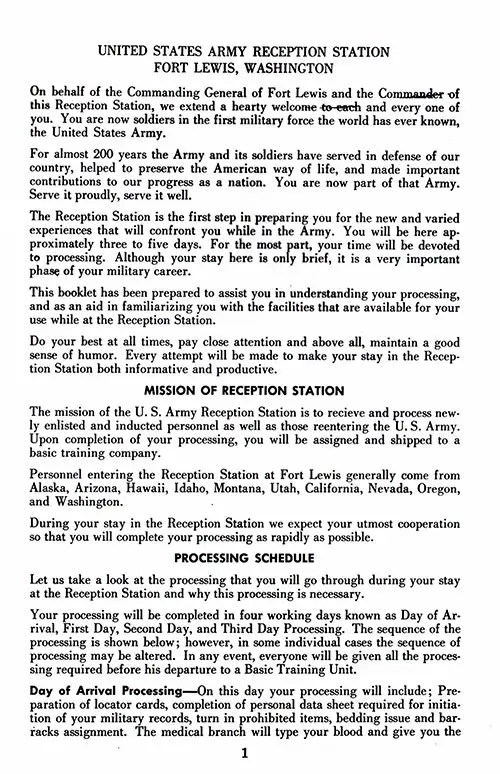
Foreward, Mission of Reception Station, Processing Schedule (Part 1). Ft. Lewis Reception Station, 1950s. | GGA Image ID # 23458c61d2
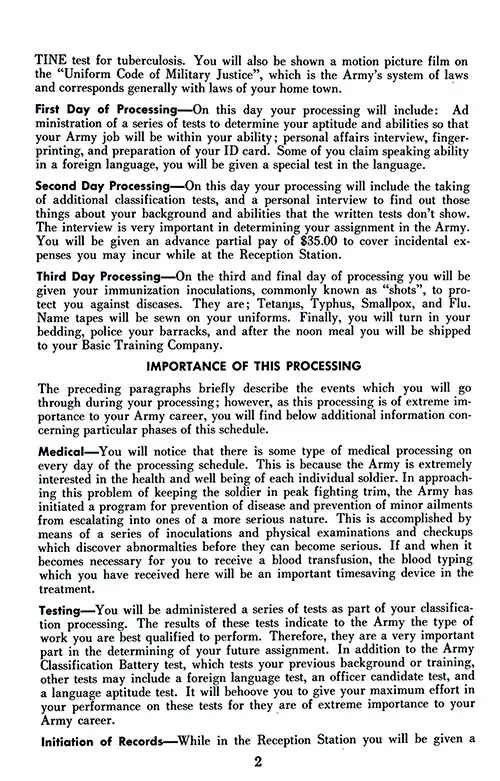
Processing Schedule (Concluded) and Importance of This Processing (Part 1). Ft. Lewis Reception Station, 1950s. | GGA Image ID # 234651aa49
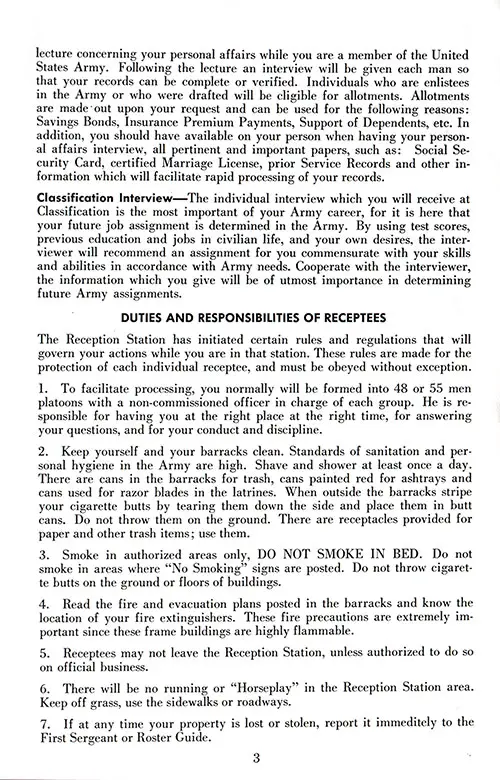
Importance of This Processing (Concluded). Duties and Responsibilities of Receptees (Part 1). Ft. Lewis Reception Station, 1950s. | GGA Image ID # 2347c3af89
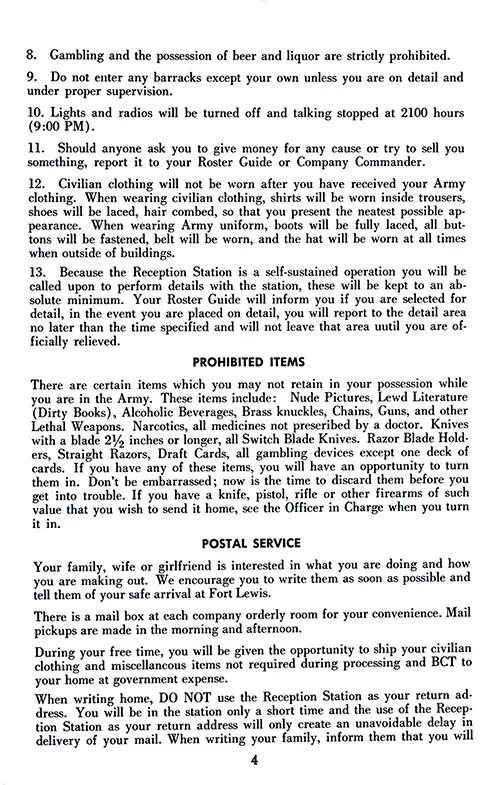
Duties and Responsibilities of Receptees (Concluded), Prohibited Items, and Postal Service (Part 1). Ft. Lewis Reception Station, 1950s. | GGA Image ID # 2346545d88
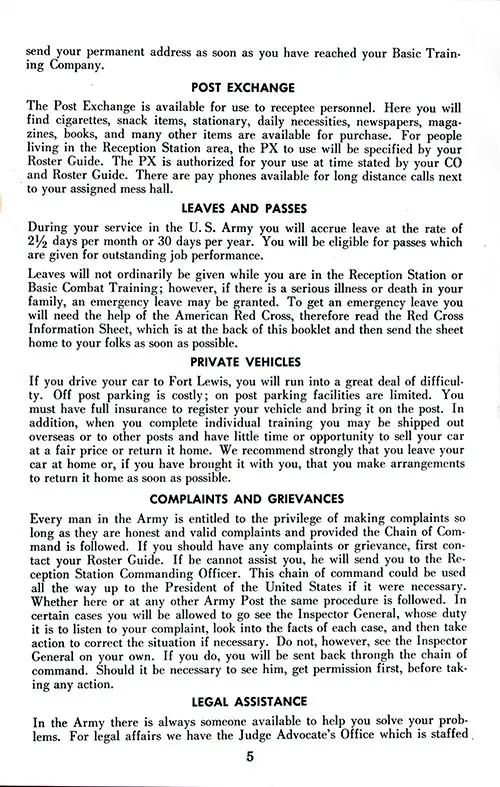
Postal Service (Concluded), Post Exchange, Leaves & Passes, Private Vehicles, Complaints and Grievances, and Legal Assistance (Part 1). Ft. Lewis Reception Station, 1950s. | GGA Image ID # 2346559885
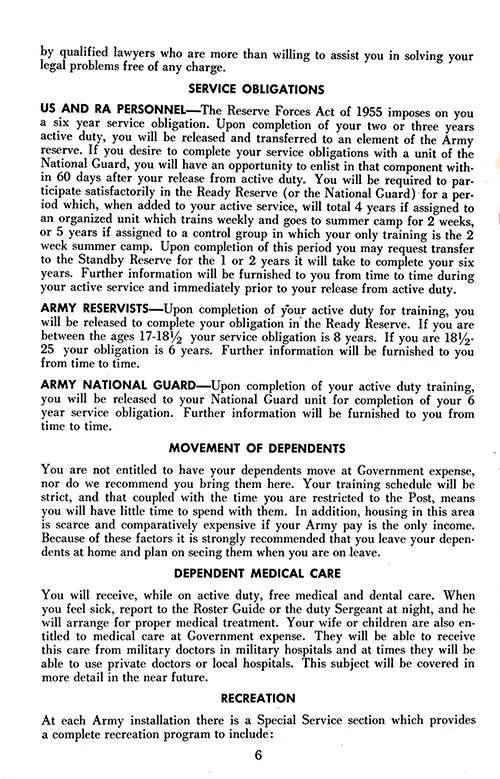
Legal Assistance (Concluded), Service Obligations, Movement of Dependents, Dependent , and Recreation (Part 1). Ft. Lewis Reception Station, 1950s. | GGA Image ID # 23465d6dbe
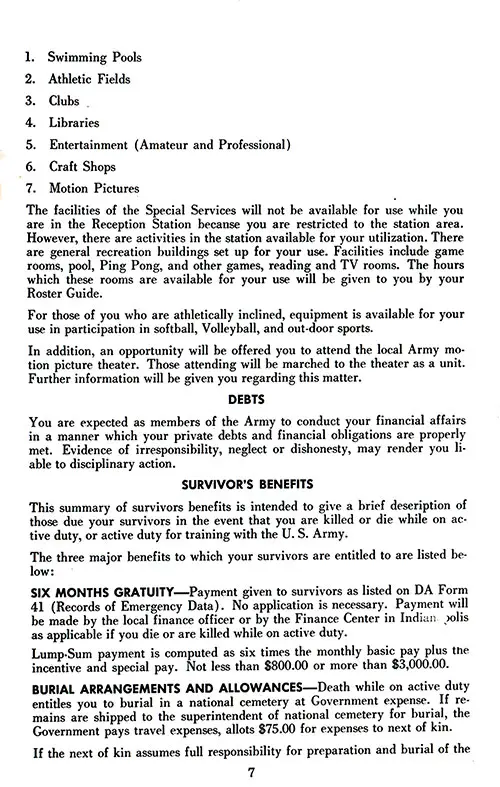
Recreation (Concluded), Debts, Survivor's Benefits (Part 1). Ft. Lewis Reception Station, 1950s. | GGA Image ID # 234716db8d
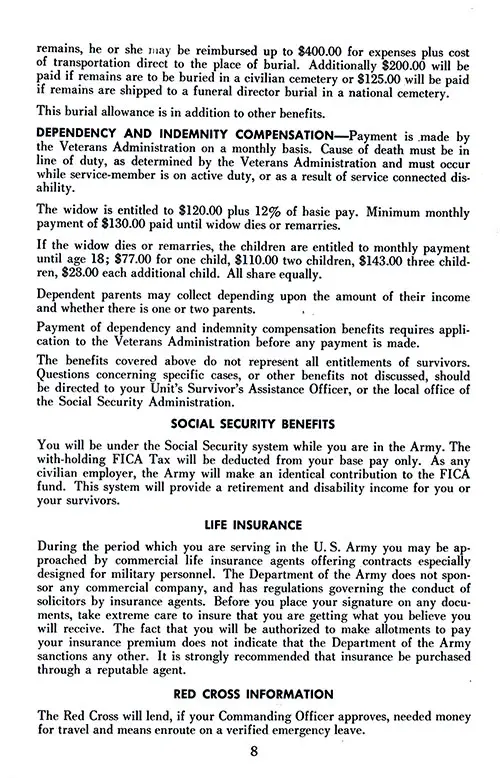
Survivor's Benefits (Concluded), Social Security Benefits, Life Insurance, Red Cross Information (Part 1). Ft. Lewis Reception Station, 1950s. | GGA Image ID # 234723a6b2
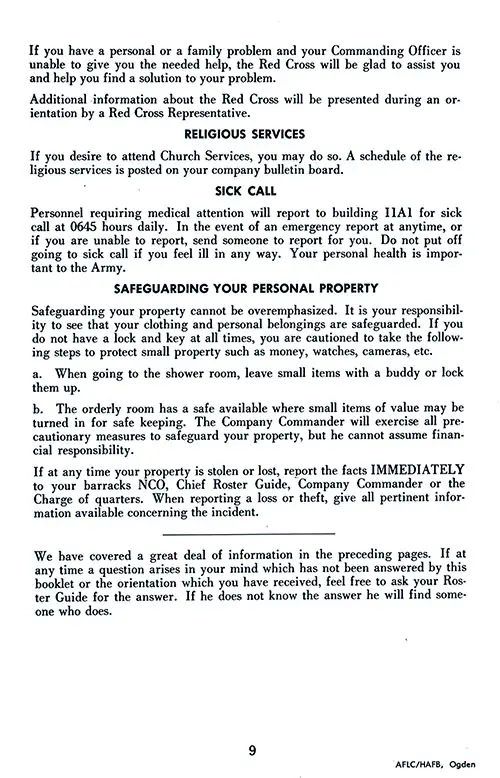
Red Cross Information (Concluded), Religious Services, Sick Call, and Safeguarding Your Personal Property. Ft. Lewis Reception Station, 1950s. | GGA Image ID # 2347b842ad
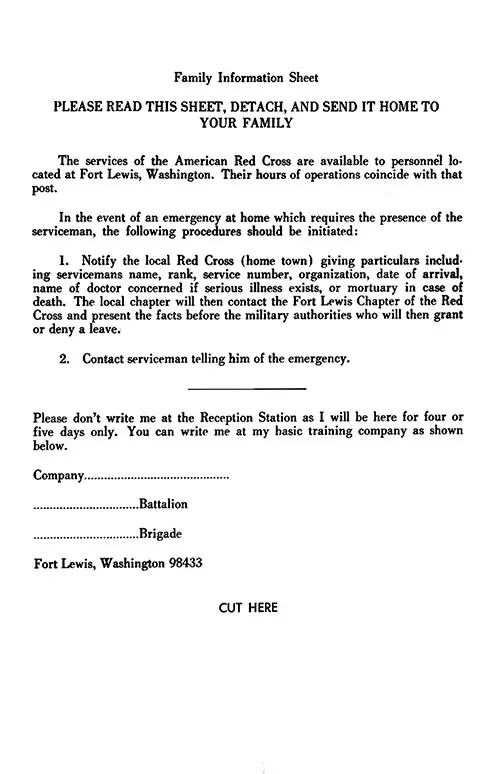
Family Information Sheet. Ft. Lewis Reception Station, 1950s. | GGA Image ID # 2345719222
🔗 Suggested Internal Links (GG Archives)
🌐 Suggested External Links
✍️ Intended Audience Relevance
📚 For Teachers and Students
Curriculum Tie-ins: U.S. military history, Cold War studies, civic engagement, and social structure.
Essay Prompt Ideas:
- “From Civilian to Soldier: Analyzing the Reception Experience at Fort Lewis”
- “What Does the Army Expect? Exploring Discipline and Structure in the 1950s”
- “The Role of Humor and Structure in Military Onboarding”
- “Processing as Propaganda: How the Army Motivates and Recruits”
- “Daily Life in Uniform: Then and Now—A Comparative Essay”
🧬 For Genealogists and Historians
🪖 Understand what your ancestor experienced at the start of their military journey.
🔍 Clues about training locations, medical requirements, and records handling.
📋 Terminology like “roster guide,” “classification interview,” or “DA Form 41” aids in decoding service records.
🎖️ For Veterans and Families
An opportunity to connect with or explain personal service experiences to younger generations.
Learn how basic Army values—teamwork, duty, and readiness—were instilled from Day One.
📦 For Collectors and Archivists
A cleanly laid out, period-authentic publication ideal for Cold War military ephemera collections.
Includes multiple original photos and robust content across nearly a dozen topic areas.
🔍 Most Engaging Sections
🗓️ The Day-by-Day Schedule
Clearly outlines a 4-day phased process including arrival, fingerprinting, testing, classification interviews, physicals, vaccinations, and movement to basic training. Especially engaging for students and reenactors looking to recreate the routine.
🎖️ Discipline & Behavior Rules
Lists over a dozen “do's and don’ts,” including quirky 1950s details:
- “DO NOT SMOKE IN BED”
- “No horseplay in the barracks”
- “Civilian clothing may not be worn after receiving Army clothing.”
🧠 Mental and Moral Readiness
Frequent encouragement to keep a sense of humor, follow rules, and seek help from chaplains or Red Cross if needed—making this a surprisingly humanizing document.
💵 Pay, Passes & Perks
Mentions leave policies, $35 advance pay, use of Post Exchange (PX), and long-term financial planning through Social Security, VA, and Life Insurance programs.
📸 Noteworthy Images
Front Cover – Cartoonish design showing a soldier "Sweating the Details" (Image ID #23452b1681)
Processing Schedule Panel – Explains procedures in vintage Army typestyle (Image ID #23458c61d2)
“Family Information Sheet” – A heartwarming send-home note with Red Cross info (Image ID #2345719222)
Debts & Survivor’s Benefits – Reveals financial ethics and benefits framework (Image ID #234716db8d)
🧠 Mini Dictionary for Civilians
Term: Meaning
Receptee: A new soldier undergoing reception processing
PX Post Exchange: On-base convenience store
Roster Guide: A designated NCO or soldier who helps manage new recruits
TINE: Test Tuberculosis screening method
DA Form 41: Emergency data and survivor benefits record
🛡️ Editorial Note: Summaries and transcribed materials may use updated language to ensure it is safe and appropriate for readers age 13+. The original brochure text is preserved below in its original form for historical accuracy and transparency. Please use discretion when reading older materials, as norms and phrasing have evolved.
